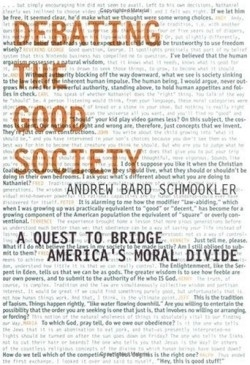Debating the Good Society
A Quest To Bridge America's Moral Divide
Proving the old adage true that it’s better to know some of the questions than all of the answers, this stimulating book by writer and National Public Radio talk-radio host Schmookler presents a fictional Internet discussion on the topic of goodness, specifically “what is the ‘grain’ of our natures and how does this correspond to the requirements of order?”
Appointing himself “secretary for this cyber-meeting,” Schmookler launches the forum by asking if his son’s passion for playing video games in his free time mirrors the greater conundrum of whether or not it is in our nature to act wisely and worthily in the face of unconstrained liberty.
What follows is a series of thoughtful, if cerebral, e-mails from both the proponents of the natural wisdom theory and the traditionalists who feel a handed-down social order is needed to tame the universal wolf in us all. The idea behind such an ideological exchange on how we govern human affairs is meant to show that the “real truth lies not between but above the extremes.”
The contemporaneity of the e-mail format might make this age-old (but still relevant) topic more palatable to today’s readers, packed as these messages are with timely and wide-ranging references (Jedi teachers as role models, Braveheart as demonstrating might vs. right, etc.). The format also shows how, in the hands of a good mediator, even a polarized discussion might result in reconciling contradictions about order and liberty into a higher truth. Schmookler challenges the participants to question any assumptions that emphasize winning over learning and shows by arguing through reason how to “move people away from less valid positions to more valid ones.”
Given that most of the charm of e-mail lies in its being both interactive and immediate, the book is best read in bits to compensate for what can come across as ponderous on the page. Taken in small doses, messages that also seem similar in style (all were penned by Schmookler, after all) can be appreciated for their rich references and insight. A dramatis personae would have been helpful to distinguish the twenty-five or more discussion participants. Always effective, though, are Schmookler’s cogent summaries and lively vignettes that illustrate some of the issues raised and the thought-provoking questions he poses throughout.
Schmookler believes that “our confusions about morality…are leading to real pathologies in the lives of millions.” Even if he doesn’t leave us with definitive answers to the questions at the heart of the confusion, he reminds us that the means to reach workable solutions lie within each of us.
Reviewed by
Judy Hopkins
Disclosure: This article is not an endorsement, but a review. The publisher of this book provided free copies of the book to have their book reviewed by a professional reviewer. No fee was paid by the publisher for this review. Foreword Reviews only recommends books that we love. Foreword Magazine, Inc. is disclosing this in accordance with the Federal Trade Commission’s 16 CFR, Part 255.


